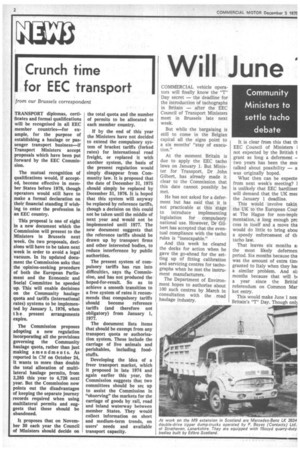Crunch time
Page 4

If you've noticed an error in this article please click here to report it so we can fix it.
for EEC transport from our Brussels correspondent TRANSPORT diplomas, certificates and formal qualifications will be recognised in all EEC member countries—for example, for the purpose of establishing a haulage or passenger transport business—if Transport Ministers accept proposals which have been put forward by the EEC Commission.
The mutual recognition of qualifications would, if accepted, become effective in member States before 1978, though operators would still have to make a formal declaration on their financial standing if wishing to enter the profession in an EEC country.
This proposal is one of eight In a new document which the Commission will present to the Ministers in Brussels next week. On two proposals, decisions will have to be taken next week in order to avoid a legal vacuum. In its updated document the Commission asks that the opinion-seeking procedure of both the European Parliament and the Economic and Social Committee be speeded up. This will enable decisions on the Community haulage quota and tariffs (international rates) systems to be implemented by January 1, 1976, when t h e present arrangements expire.
The Commission proposes adopting a new regulation Incorporating all the provisions governing the Community haulage quota, rather than just making amendments. As reported in CM on October 24, It wants to more than double the total allocation of multilateral haulage permits, from 2,285 this year to 4,726 next year. But the Commission now points out the disadvantages of keeping the separate journey records required when using multilateral permits and suggests that these should be abandoned.
It proposes that on November 30 each year the Council of Ministers should decide on the total quota and the number of permits to be allocated to each member country.
If by the end of this year the Ministers have not decided to extend the compulsory system of bracket tariffs (forked rates) for international road freight, or replaced it with another system, the basis of the present regulation would simply disappear from Community law. It is proposed that the date of December 31, 1975 should simply be replaced by December 31, 1976. It is hoped that this system will anyway be replaced by reference tariffs, though a decision on this could not be taken until the middle of next year and would not be implemented until 1977. The new document suggests that the reference tariffs should be drawn up by transport firms and other interested bodies, to reduce interference by public authorities.
The present system of compulsory tariffs has run into difficulties, says the Commission, and has not produced the hoped-for-result. So as to achieve a smooth transition to a free system of rates it recommends that compulsory tariffs should become reference tariffs (and therefore not obligatory) from January 1, 1977.
The document lists items that should be exempt from any transport quota or authorisation system. These include the carriage of live animals and perishables, including foodstuffs.
Developing the idea of a freer transport market, which it proposed in late 1974 and again earlier this year, the Commission suggests that two committees should be set up to assist the Commission in "observing" the markets for the carriage of goods by rail, road and inland waterway between member States. They would collect information on short and medium-term trends, on users' needs and available transport capacity.


































































































































